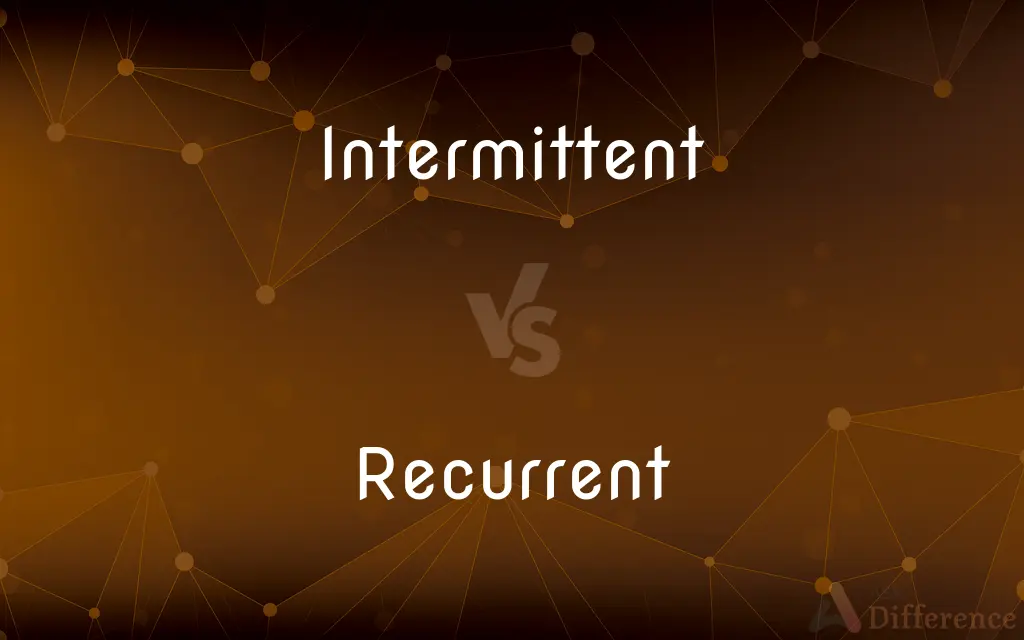Intermittent vs. Recurrent — What's the Difference?
By Fiza Rafique & Urooj Arif — Updated on March 11, 2024
Intermittent events occur at irregular intervals, while recurrent events happen repeatedly at more predictable intervals.

Difference Between Intermittent and Recurrent
Table of Contents
ADVERTISEMENT
Key Differences
Intermittent events are characterized by their irregular occurrence, meaning they start and stop at unpredictable intervals. On the other hand, recurrent events happen with regularity or predictability, often following a pattern or cycle.
While both intermittent and recurrent events are not constant, their key difference lies in the predictability and pattern of occurrence. Intermittent phenomena are unpredictable and can occur after varying periods of absence, whereas recurrent phenomena follow a more predictable pattern or cycle, even if there are periods of absence between occurrences.
The predictability of recurrent events allows for better planning and management. For instance, if a machine fails recurrently, maintenance can be scheduled in anticipation. However, the unpredictability of intermittent events, like sudden equipment failure, requires a more flexible and responsive approach to management.
In terms of impact, intermittent events can be more disruptive due to their unpredictability. For instance, intermittent internet connectivity issues can be more frustrating than a recurrent issue that happens at known times. Recurrent problems, while potentially annoying, allow individuals and systems to adapt or prepare for their occurrence.
Comparison Chart
Frequency
Irregular intervals
Regular intervals or patterns
ADVERTISEMENT
Predictability
Unpredictable
Predictable
Planning
Difficult to plan for
Easier to plan for
Management
Requires flexibility and responsiveness
Allows for anticipation and preparation
Impact
Can be more disruptive due to unpredictability
Less disruptive as it allows for adaptation
Compare with Definitions
Intermittent
Occurring at irregular intervals.
Intermittent rain made the picnic unpredictable.
Recurrent
Happening repeatedly at regular intervals.
His recurrent headaches were a cause for concern.
Intermittent
Not continuous or steady.
He suffered from intermittent connectivity issues.
Recurrent
Regularly repeated or renewed.
The garden required recurrent maintenance.
Intermittent
Happening sporadically.
Intermittent power outages plagued the small town.
Recurrent
Chronic or persistent.
She was dealing with a recurrent infection.
Intermittent
Occasional or infrequent.
They took intermittent breaks during the hike.
Recurrent
Returning or happening time after time.
The recurrent theme in his novels is love.
Intermittent
Spasmodic or random in nature.
She experienced intermittent symptoms that baffled her doctors.
Recurrent
Cyclical or seasonal.
Recurrent flooding during the monsoon season was common.
Intermittent
Occurring at irregular intervals; not continuous or steady
Intermittent rain
Recurrent
Occurring or appearing again or repeatedly.
Intermittent
Stopping and starting at intervals.
Recurrent
Recurring; happening time after time.
The patient complained of recurrent chest pain.
Intermittent
Alternately containing and empty of water
An intermittent lake.
Recurrent
Non-transient.
Intermittent
Stopping and starting, occurring, or presenting at intervals; coming after a particular time span.
The day was cloudy with intermittent rain.
Intermittent bugs are most difficult to reproduce.
Recurrent
(anatomy) Running back toward its origin.
A recurrent nerve or artery
Intermittent
Existing only for certain seasons; that is, being dry for part of the year.
The area has many intermittent lakes and streams.
Recurrent
(entomology) Turned back toward the base.
Intermittent
An intermittent fever or disease.
Recurrent
Returning from time to time; recurring; as, recurrent pains.
Intermittent
Coming and going at intervals; alternating; recurrent; periodic; as, an intermittent fever.
Recurrent
Running back toward its origin; as, a recurrent nerve or artery.
Intermittent
An intermittent fever or disease.
Recurrent
Recurring again and again;
Perennial efforts to stipulate the requirements
Intermittent
Stopping and starting at irregular intervals;
Intermittent rain showers
Intermittent
Stopping and starting at regular intervals
Common Curiosities
How can intermittent events impact daily life?
Intermittent events can lead to unpredictability and disruption in daily life, requiring flexibility and adaptability.
What does recurrent mean?
Recurrent refers to events that happen repeatedly, following a predictable pattern or cycle.
What does intermittent mean?
Intermittent refers to events or occurrences that happen at irregular intervals, not continuously or steadily.
How does the predictability of recurrent events help?
The predictability of recurrent events allows for better planning and preparation, reducing their potential disruption.
Are intermittent issues harder to solve than recurrent ones?
Yes, because their unpredictability makes diagnosis and intervention more challenging.
What is an example of a recurrent event?
An example of a recurrent event is a daily alarm clock ringing.
What is an example of an intermittent event?
An example of an intermittent event is sporadic internet connectivity.
Is weather considered intermittent or recurrent?
Weather can display both characteristics: certain events like hurricanes may be intermittent, whereas seasons are recurrent.
How do businesses plan for intermittent versus recurrent issues?
Businesses plan for intermittent issues by maintaining flexibility and for recurrent issues by scheduling regular maintenance or interventions.
Can technology help in managing intermittent and recurrent events?
Yes, technology can aid in predicting and managing both types of events through monitoring and analysis tools.
Can an event be both intermittent and recurrent?
Generally, an event is either intermittent or recurrent due to the distinction in predictability and pattern, but some events might transition between these states over time.
Are intermittent problems more costly to address than recurrent ones?
They can be, due to the difficulty in predicting and preparing for their occurrence.
Can medical conditions be intermittent or recurrent?
Yes, medical conditions can be classified as intermittent or recurrent based on their symptoms and occurrence patterns.
How do recurrent events affect psychological well-being?
The predictability of recurrent events can lead to anxiety or stress, especially if the events are negative, but it also allows for psychological preparation and coping mechanisms.
How can one manage intermittent symptoms of a condition?
Managing intermittent symptoms may involve tracking occurrences to identify potential triggers or patterns.
Share Your Discovery

Previous Comparison
Photofit vs. Identikit
Next Comparison
Fort vs. KeepAuthor Spotlight
Written by
Fiza RafiqueFiza Rafique is a skilled content writer at AskDifference.com, where she meticulously refines and enhances written pieces. Drawing from her vast editorial expertise, Fiza ensures clarity, accuracy, and precision in every article. Passionate about language, she continually seeks to elevate the quality of content for readers worldwide.
Co-written by
Urooj ArifUrooj is a skilled content writer at Ask Difference, known for her exceptional ability to simplify complex topics into engaging and informative content. With a passion for research and a flair for clear, concise writing, she consistently delivers articles that resonate with our diverse audience.














































